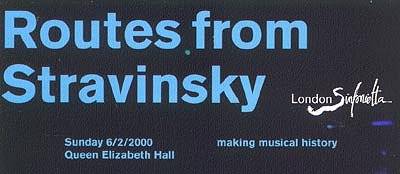
Sunday night's Royal Philharmonic Society concert (complete with the R.P.S. bust of Beethoven on the stage) concentrated on the late music of Stravinsky and its influence on three contemporary composers - Oliver Knussen (who also conducted), Julian Anderson and Geoffrey King-Gomez. In addition, the event almost became a symposium, with Stephen Walsh (acting as host) discussing what Stravinsky's music means to these composers. The whole experience was ultimately uplifting, a tribute to all concerned.
Stravinsky's ultra-short Fanfare for a New Theatre of 1964 provided the opener, two trumpeters smoothly forming an introduction to the 1952/3 Septet. Knussen conducted a beautifully-balanced account, the ensemble achieving a spectral sotto voce in the second movement. Of the pieces by Knussen himself, the Two Organa Op. 27 showed the Stravinskian shadow more than Ophelia Dances, Op. 13. The first movement, Notre Dame des Jouets is almost Petrushka-like in feeling. Knussen revealed that he heard all Stravinsky from about the time of The Flood when the ink was (metaphorically) scarcely dry, a link which obviously meant a lot to him.
Julian Anderson (born 1967) isolated Stravinsky's 'dissonant counterpoint' as Stravinsky's major influence on his musical thinking. The rigour of Stravinsky's Double Canon (1959) made the ideal beginning to the second part of the concert. Three Songs from William Shakespeare (1953) were characterfully and accurately sung by the mezzo Mary King. All this (and Stravinsky's Epitaphium) led logically up to the world première of Anderson's Alhambra Fantasy. Readers who heard his Stations of the Sun at the 1998 Proms will be aware of his confident and imaginative way with orchestration. In conversation, Anderson referred to the Sephardic and Spanish influences on this piece, so it was a surprise to find the figure of Mahler evoked at the climax. Although his use of silence was effectively dramatic, parts seemed distinctly over-chaotic.
After the second interval, Geoffrey King-Gomez discussed his Magritte Weather of 1990. King-Gomez is by his own admission preoccupied with dreams (the link with the genesis of the Rite of Spring here is obvious), but a meandering piece such as this which relies overly on vulgar effects cannot convincingly sustain its length. It seemed a shame to end such an energising concert on such a note. It has to be said that the punchy concision of Stravinsky's Concertino (1920, rev. 1952) put this 20 minute piece into the shade.
Colin Clarke
 Return to:
Return to: